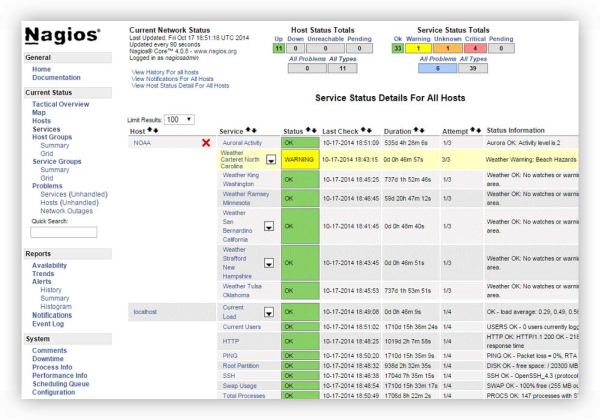Nagios is a host and service monitor designed to inform you of network problems.
The monitoring daemon runs periodic checks on hosts and services specified using external “plugins” which return status information to Nagios. When problems are encountered, the daemon can send notifications out to administrative contacts in a variety of different ways (email, instant message, SMS, etc.). Current status information, historical logs, and reports can all be accessed via a web browser.
Although Nagios is powerful and flexible, it does require some time for it to be installed and configured correctly.
Features include:
- Monitoring of network services (SMTP, POP3, HTTP, NNTP, PING, etc).
- Monitoring of host resources (processor load, disk and memory usage, running processes, log files, etc).
- Monitoring of environmental factors such as temperature.
- Simple plugin design that allows users to easily develop their own host and service checks.
- Ability to define network host hierarchy, allowing detection of and distinction between hosts that are down and those that are unreachable.
- Contact notifications when service or host problems occur and get resolved (via email, pager, or other user-defined method).
- Optional escalation of host and service notifications to different contact groups.
- Ability to define event handlers to be run during service or host events for proactive problem resolution.
- Support for implementing redundant and distributed monitoring servers.
- External command interface that allows on-the-fly modifications to be made to the monitoring and notification behavior through the use of event handlers, the web interface, and third-party applications.
- Retention of host and service status across program restarts.
- Scheduled downtime for suppressing host and service notifications during periods of planned outages.
- Ability to acknowledge problems via the web interface.
- Web interface for viewing current network status, notification and problem history, log file, etc.
- Simple authorization scheme that allows you restrict what users can see and do from the web interface.
- Automatic log file rotation/archiving.
Website: www.nagios.org
Support: Nagios Exchange
Developer: Ethan Galstad
License: GNU General Public License v2.0

Nagios is written in C. Learn C with our recommended free books and free tutorials.
Return to System Monitoring Tools
| Popular series | |
|---|---|
| The largest compilation of the best free and open source software in the universe. Each article is supplied with a legendary ratings chart helping you to make informed decisions. | |
| Hundreds of in-depth reviews offering our unbiased and expert opinion on software. We offer helpful and impartial information. | |
| The Big List of Active Linux Distros is a large compilation of actively developed Linux distributions. | |
| Replace proprietary software with open source alternatives: Google, Microsoft, Apple, Adobe, IBM, Autodesk, Oracle, Atlassian, Corel, Cisco, Intuit, SAS, Progress, Salesforce, and Citrix | |
| Awesome Free Linux Games Tools showcases a series of tools that making gaming on Linux a more pleasurable experience. This is a new series. | |
| Machine Learning explores practical applications of machine learning and deep learning from a Linux perspective. We've written reviews of more than 40 self-hosted apps. All are free and open source. | |
| New to Linux? Read our Linux for Starters series. We start right at the basics and teach you everything you need to know to get started with Linux. | |
| Alternatives to popular CLI tools showcases essential tools that are modern replacements for core Linux utilities. | |
| Essential Linux system tools focuses on small, indispensable utilities, useful for system administrators as well as regular users. | |
| Linux utilities to maximise your productivity. Small, indispensable tools, useful for anyone running a Linux machine. | |
| Surveys popular streaming services from a Linux perspective: Amazon Music Unlimited, Myuzi, Spotify, Deezer, Tidal. | |
| Saving Money with Linux looks at how you can reduce your energy bills running Linux. | |
| Home computers became commonplace in the 1980s. Emulate home computers including the Commodore 64, Amiga, Atari ST, ZX81, Amstrad CPC, and ZX Spectrum. | |
| Now and Then examines how promising open source software fared over the years. It can be a bumpy ride. | |
| Linux at Home looks at a range of home activities where Linux can play its part, making the most of our time at home, keeping active and engaged. | |
| Linux Candy reveals the lighter side of Linux. Have some fun and escape from the daily drudgery. | |
| Getting Started with Docker helps you master Docker, a set of platform as a service products that delivers software in packages called containers. | |
| Best Free Android Apps. We showcase free Android apps that are definitely worth downloading. There's a strict eligibility criteria for inclusion in this series. | |
| These best free books accelerate your learning of every programming language. Learn a new language today! | |
| These free tutorials offer the perfect tonic to our free programming books series. | |
| Linux Around The World showcases usergroups that are relevant to Linux enthusiasts. Great ways to meet up with fellow enthusiasts. | |
| Stars and Stripes is an occasional series looking at the impact of Linux in the USA. | |
